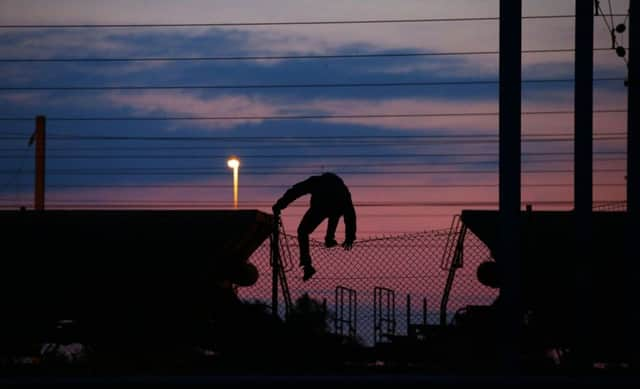Leaders: More than plaster needed for Calais crisis


Yesterday’s announcement by Home Secretary Theresa May that British officers will be deployed to a new “command and control” centre alongside their French counterparts is merely a sticking plaster for a chronic complaint requiring an altogether more sophisticated remedy.
The plans seek to disrupt the criminal gangs who trade in human misery by smuggling migrants into northern France and across the Channel.
Advertisement
Hide AdAdvertisement
Hide AdThe police’s work will be led by two senior “gold” commanders – one from each country.
UK resources will also be invested to make the Eurotunnel secure through fencing, CCTV, flood lighting and infrared detection technology.
Security will be tightened within the tunnel itself, with Eurotunnel helped to increase the number of guards protecting the site. These most obvious of measures have taken weeks, but what will they actually achieve?
At best, they will disrupt and inconvenience the smugglers – nothing more. At worst, they risk moving the problem elsewhere.
As Labour MP Keith Vaz noted yesterday, the difficulties being experienced at Calais could be transposed to another entrepôt, with indications that there is already growing illegal activity at Dunkirk, Zeebrugge and the Hook of Holland.
To be fair to the Home Secretary, work has already begun with Belgium and Holland amid suggestions traffickers may attempt to smuggle migrants to the UK through these routes.
Immigration minister James Brokenshire has spoken to officials in the two countries and is expected to travel for further discussions. However, the suggestion that officials can tour the camps to tell migrants that UK streets are not actually paved with gold is risible.
These are desperate people fleeing war and persecution – their perilous journeys to these shores are testament to how much they are willing to risk to make a new life for themselves.
Advertisement
Hide AdAdvertisement
Hide AdThey are not looking for gold, but for a safe place to live, a place where they don’t face the daily risk of being shot or bombed out of their homes.
We should welcome the fact that the two countries are working together on this rather than one blaming the other, but any action can only be effective if both France and the UK, along with other EU countries, seriously address together why migration is happening, and what the EU can do to accommodate fairly those who have legitimate reason to seek refugee status.
With figures yesterday showing more than 100,000 migrants reached EU borders in July alone, the situation is more pressing than ever.
A watchdog is needed, not a lapdog
AFTER enduring months of criticism over a force which appears to lurch from one controversy to the next, Chief Constable Sir Stephen House yesterday broke cover to offer up a staunch defence of the national service.
Issuing a joint statement with the chairman of the Scottish Police Authority, Sir Stephen said Police Scotland was better equipped to fight modern-day crime than the eight regional forces it succeeded.
In an age when cybercriminals do not respect national, never mind regional borders, Sir Stephen is right to point out the importance of sharing resources and pooling knowledge, something which did not routinely happen under the legacy arrangements.
But we must not forget that the whole raison d’être of Police Scotland is to save money, a grand total of £1.1 billion by 2026 to be exact.
Had there not been such a monumental squeeze on the public purse, it’s unlikely the political will would ever have been found to disband the eight regional forces.
Advertisement
Hide AdAdvertisement
Hide AdWhere its predecessors enjoyed a generally favourable relationship with the public at large, Police Scotland is at risk of squandering that goodwill following rows over issues such as stop and search and the appalling situation which led to Lamara Bell and John Yuill’s car not being found until three days after it left the M9 last month.
While one would expect the Chief Constable to defend his force, it’s not clear why SPA chair Vic Emery also felt the need to put his name to the statement. In these difficult times the force needs a watchdog, not a lapdog.